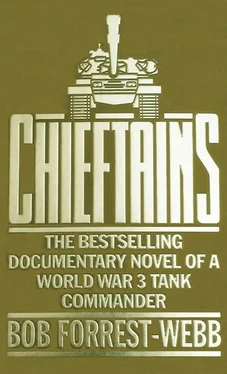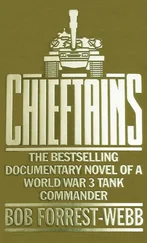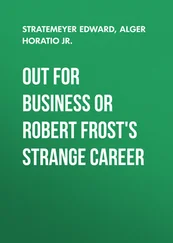He remembered a conversation with his father a few days before he had left for Ireland. ‘Don’t try to be a hero,’ his father had said.
He had laughed at the well-meant advice which was almost a cliche. ‘Chance would be a fine thing.’
‘That’s exactly what I mean. Don’t look for the opportunity. Heroes have a tendency not to survive.’
‘It’s not a war, Dad.’
‘It’s active service, and the nearest thing to a war you may ever have to fight. Don’t be tempted to use your tour of duty to test your courage. That’s not its purpose.’
‘Things have changed in the army, Dad. It’s a lot more organized than in your day; modern communications are very sophisticated… satellites, advanced radio techniques. We have computers… we just feed in the information, and the instruments come up with the answers. Our intelligence is first-class… radar… infra-red detectors… electronic sensors… we know every move an enemy can make. It’s all very organized and technical. About the only decision I have to make, is when to clean my teeth.’
Everything had seemed so neat and orderly. Then. Clean smart uniforms, instructors who fed you their information lucidly and with assurance, orders given and immediately obeyed.
‘This is a Scimitar.’ The usual army practice of treating everyone in training, even young officers, as complete idiots. ‘Welded aluminium construction. Fast, light and manoeuvrable. Pretty, gentlemen, very pretty. First-class reconnaissance vehicle. Crew three. Length 4.743 meters, width 2.184 meters, height 2.115 meters. Maximum road speed eighty-seven kilometers an hour. Range, six hundred and forty-four kilometers. It will climb a vertical object of half a meter, or a trench two meters wide. No nasty habits, well-bred, and a little on the fancy side. A nice smart charger for a Lancer gentleman. Treat her right, and she’ll look after you. And what appears to be a punt-gun on her turret, is a Rarden cannon; ninety to a hundred rounds a minute. Single shots, or bursts of up to six rounds. Case ejected outside the vehicle, so they don’t scrape the burnish off your toecaps. Interesting ammunition, the round doesn’t arm until it is twenty meters from your barrel, and if it doesn’t hit the target in eight seconds, blows itself to pieces. Very convenient… tidy. You are going to learn everything about it, gentlemen, and I am going to teach you.’
‘This is your ammunition: TP; TP-T; MINE HEI-T; SAPHEI, APIC-T.’
‘A Helmgard helmet, Mister Sache-Worrel. And what is it fitted with? Accoustic valves to protect your delicate eardrums! And what else? Right! Your communications facilities. And these are part of…? Yes, Clansman… your communications system. Eight hundred and forty channels available, gentlemen; HF and VHF; frequency coverage from one point five to seventy-five point nine seven five MHz, and two hundred and twenty-five to three hundred and ninety-nine point zero MHz.’
‘This gentlemen, is the ZB 298 battlefield surveillance radar, which can be fitted to reconnaissance vehicles… the thermal imaging sight… lasar range-finder… the night vision gunner’s sight… you need to know about mines, gentlemen; this is a film of the Ranger mine discharger system; the discharger holds one thousand two hundred and ninety-six mines in one load, and can fire out eighteen mines a second… bar mines are laid by ploughs; seven hundred an hour… note the angles of your smoke grenade dischargers; a full hundred and eighty degree smoke screen… gentlemen, this is not a cage for the display of baboons, though I sometimes wonder, this is the Morfax gunnery simulator…’
So much information, but still confusion…
Would his father have been confused, too, wondered Sache-Worrel? His own war had lasted less than twenty-four hours and he had no idea what was happening. His father’s war had lasted five years. Could doubt and uncertainty last that long, or was it eventually overcome? And fear? War had not really begun for him yet… it was early days… hours… and yet he had already been terrified. He had seen death at a distance but not yet touched it. He realized how condescending he must have sounded to his father… wars were all the same. You might fight them with different weapons, in different places, but they were the same.
‘Robin…’
‘Yes, Ben.’
‘I think we should try and make ourselves useful. Hinton’s moving out now. We’ll head back towards the west and have a go at the Ruskie engineering units; create a bit of mayhem with their soft-skinned transports. Strike, cut and run, keep on the move. Are you game?’
Sache-Worrel nodded. ‘Yes, I’m game.’ What was it Mister Hatton his schoolmaster used to say? Don’t think you’ve lost, just because you’re fifteen points down at half time; you can still win.
It was different now, thought Morgan Davis; working better. The battle groups were holding the Russians! The minefields on the eastern bank of the River Schunter had been carefully laid with plenty of depth. The NATO gunners, covering it from well to the rear of the armour, had wiped out the first of the Soviet recce squadrons with a spectacular copy-book strike.
A large number of sensors, still operative deep in the ground through which the Soviet division was attempting to move, were feeding information back to the artillery observers and continuously giving them new targets. Unfortunately, in many cases, blanketing the area where an electronic sensor detected and reported transport movement also meant the destruction of the device. But nevertheless they were proving effective. The Soviet division had for the moment lost its momentum; the head of the attack had weakened.
Warrant Officer Davis still knew little of the progress of the war outside the Elm Sector. He had heard rumours that the Russian forces had captured Lübeck and Hamburg in the north, and the Americans in CENTAG, supported by the French and German corps, had pushed the invaders back into East Germany as far as the town of Nordhausen. He realized however, the stories were unlikely to be fact, as he felt certain the NATO forces would not be permitted to advance into Warsaw Pact territory. Everyone was guessing, and those with the most fertile imaginations guessed the wildest. Stones grew in wartime, and everyone liked to think they knew something special or had experienced something unique; like the Angel of Mons. Angel of bloody Mons. Christ, we could do with one here, he mused. But the Angel of Mons had been only imagination, too… no’ one had even mentioned one until years after the First World War when some London journalist wrote a fictional short story about the battle and the intervention of a host of Heavenly warriors; then everyone remembered — or thought they did The Russians in Hamburg? They might well get there eventually, but by God they would have had to shift to be in the city by now. Hedda and the kids? They’d be okay. Hedda would see to that. Bloody good bird, Hedda. Bird? Lady. Warrant officers’ wives weren’t birds. And the kids, too. They were nearly officer’s kids now. And he wouldn’t be spading the rest of his army career as a warrant officer, there would certainly be more promotion ahead… a commission to lieutenant… captain… major? Christ, it was impossible. Hedda the wife of a British major, hell, she would lap it up. It would be great for them all.
There had been a lull for the past half hour, following a rocket barrage that passed beyond Charlie Squadron’s present positions, and landed harmlessly in open farmland There was still artillery fire from both sides, but it all seemed to be aimed behind the front lines. There was nothing to be seen moving in the vision-intensifying lenses… the Russians were somewhere in the darkness… they were there… but they weren’t coming right now.
Читать дальше












